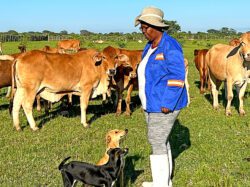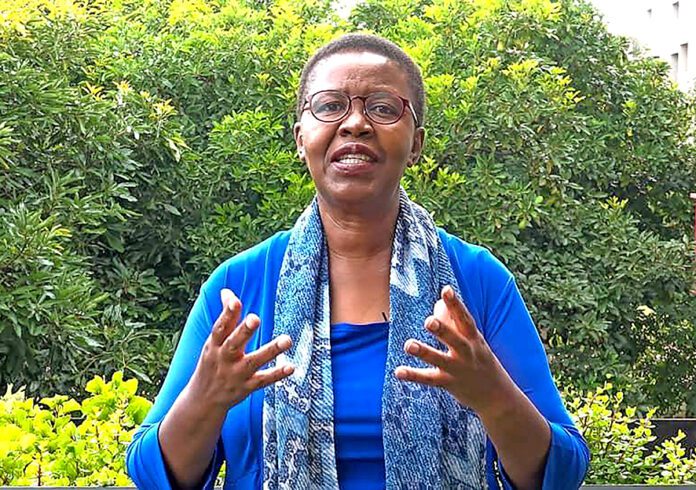When animal scientist and farmer prof Lindiwe Majele Sibanda was studying towards a BSc degree in animal science at the University of Alexandria in Egypt, she was the only woman in her class specialising in livestock production.
On Friday, Sibanda left for France, the headquarters of the world’s largest agricultural innovation network CGIAR for her new assignment as chair of its system board – making her the first African, first woman and first candidate from the global South to do so.
The 59-year-old, who was the director of the African Research Univesities Alliance’s Centre of Excellence in Food Security hosted by the University of Pretoria until her appointment at CGIAR this month, chuckles when asked where she will be based. Will it be at the headquarters in Montpellier?
“In an aeroplane,” she quips, “CGIAR operates in 33 countries with the purpose to conduct public good research on key commodities, ranging from edible livestock, maize, wheat, rice, millet, sorghum, beans, potatoes and trees and forests as part of agro-forestry to water systems, climate and biodiversity.”
She is no stranger to CGIAR, which has 15 research centres around the world focus on improving the quality and quantity of food production while safeguarding the environment. She has served at five of the centres in different capacities since 2009.
In 2021, she served as a board member of the CGIAR’s system board that oversees the independent boards of the 15 research centres.
“All my work has been in the business of food, agriculture and natural resources as a researcher and as an advocate for good policies,” she said during a virtual interview on Wednesday from her farm in Zimbabwe, her home country.
Sibanda said three years ago the research centres realised they need to have one common approach, vision, mission and one board.
“They came together and in the past three years have been on a journey to put together a one system board. I’ve been a member of that board for the whole of 2021.”
She was appointed chair last year. Before joining UP in 2018, Sibanda was vice-president for the Alliance for Africa’s Green Revolution based in Nairobi. Sibanda, whose grandparents and parents were farmers, fell in love with agriculture at a young age.
“In Zimbabwe, most of my generation came to the cities for school, and we went to the villages some weekends and on on school holidays.
“We would join our grandparents in agriculture production,” she speaks fondly of her youth, adding that she would be joined by her siblings and cousins, sometimes they would be 20 of them at her homestead.
“During those times we produced food in the village that was taken to the city. It’s only when I got to South Africa that I saw people depending on supermarkets.
“For a long time in Zimbabwe we depended on the village for food. We would bring dried meat, beans and milk to the city. We would bring our ground maize meal pounded by us to the city. The only thing we would need is sugar and salt and other things that we didn’t produce.”
She was offered a government scholarship to study in Egypt. Out of 15 areas of specialisation, she chose livestock production.
“When they asked me why would a girl want to do study a field that involves castrating animals and spending time in the bush, I told them that my grandmother rationed the meat to one small piece every day, so I want to master how to grow meat to be able to eat as much I want.”
“I went on to do my master’s in England on managing pastures and my PhD on goat production was the first PhD in Zimbabwe on goats. I had to register in England because in 1989 I was told there was no one to supervise me in Zim. No one had done a PhD on goats. It was seen as backward, primitive and there was no literature, but in England they were already working on milk goats, so I had to register there.
‘Being on the farm relaxes me’

Prof Lindiwe Sibanda, a mother of three, loves spending time on her farm. Even days before taking on her new role, she was admiring her handy work.
“One thing that relaxes me is being at the farm. I do cattle and when I think the rains are good, I do maize production,” she says.
“At times farming is just being at the farm, sleeping in the farm and hearing the cows bellow in the background. It just gives me that fulfilment that I don’t get from anywhere else.”
This year, she planted maize in November at the start of the planting season.
“My crop is looking good,” she says, “There’s nothing as complex as feeding farm workers. If you ration them with food, you’re also rationing productivity. So, it’s always good when they can eat as much pap as they want. So, we always want to make sure that we grow our own.
“But for the past few years because of climate change it has not been possible to plant. Last year, people were planting as late as December and January because the rains delayed, and they were erratic. I decided not to plant, and I think I was wise because 80% of Zimbabwean farmers who planted maize crop didn’t harvest much,” she says.
How much meat does she eat?
“I have become a big champion on sustainable health systems and in terms of age you start being wary of quantities. I’m still a big advocate that we need meat on our plate despite what the world says. There are micro-nutrients that come from meat that build our body better than synthetic food or crop.
“I now realise my grandmother was smart to give us 40 grams of meat at a sitting.”
“I’m still a good meat eater but I’m wary of portions and I also want diversity on my plate. You need your several colours on your plate because no one food can deliver a healthy diet. I was never a big fruit eater but now I make sure I get my five portions a day. It is all about quantity and diversity,” she says.
Sibanda is planning a great union with friends and family to celebrate her 60th birthday later in the year.
Follow @SundayWorldZA on Twitter and @sundayworldza on Instagram, or like our Facebook Page, Sunday World, by clicking here for the latest breaking news in South Africa. To Subscribe to Sunday World, click here.



